|
|
|
Sort Order |
|
|
|
Items / Page
|
|
|
|
|
|
|
| Srl | Item |
| 1 |
ID:
125905
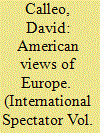

|
|
|
|
|
| Publication |
2013.
|
| Summary/Abstract |
America's diplomacy towards Europe has passed through two broad historic phases. A first, isolationist phase, determined in part by America's need to maintain its domestic multinational consensus, was replaced, after World War II and under the Soviet threat, by a policy of hegemonic engagement. The Soviet collapse opened a new era forcing a reinterpretation of America's role in Europe and the world. Four different narratives have emerged: triumphalist, declinist, chaotic or pluralist. If a unipolar American role seems unlikely to persist, American decline is all too possible. A new hegemonic replacement seems unlikely, which makes the pluralist narrative plausible and desirable. This multipolar world will require an adaptation of the Western alliance and a new way of thinking about interstate relations. Confederal Europe, for its experience in bargaining and conciliation, might have much to offer to the new plural world order.
|
|
|
|
|
|
|
|
|
|
|
|
|
|
|
|
| 2 |
ID:
115189
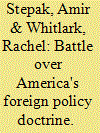

|
|
|
|
|
| Publication |
2012.
|
| Summary/Abstract |
One balmy Washington evening in June 2011, President Barack Obama was set to deliver a highly anticipated address declaring the drawdown of US forces in Afghanistan. What he delivered, however, was much more. In his speech, Obama laid out a clear foreign-policy doctrine, touching on the role the United States should play in world affairs, the values it holds dear, and the principles guiding its use of force and diplomatic efforts. Rejecting the divergent paths of isolationism and expansionism, Obama called for 'a more centered course':
|
|
|
|
|
|
|
|
|
|
|
|
|
|
|
|
| 3 |
ID:
123665


|
|
|
|
|
| Publication |
2013.
|
| Summary/Abstract |
Are Americans becoming more "isolationist"? Four years ago, for the first time since the Vietnam War, almost half of those polled by the Pew Research Center stated they would rather the United States "mind [its] own business internationally and let other countries get along the best they can on their own" and work to "reduce military commitments overseas" in order to decrease the deficit. Such cautious views about American involvement abroad are on the rise, up ten percentage points over the past decade, according to Pew polls released in 2011 and 2012. A majority of Americans think the United States is withdrawing from Afghanistan too slowly and are reticent to take direct action in Syria. This article explains the long historical context of these recent events to argue for the enduring power and significance of isolationist thought.
|
|
|
|
|
|
|
|
|
|
|
|
|
|
|
|
| 4 |
ID:
155905
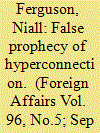

|
|
|
| 5 |
ID:
082030


|
|
|
|
|
| Publication |
2008.
|
| Summary/Abstract |
Americans' feelings about foreign countries are embedded in foreign policy belief systems and affect policy preferences. The analysis of nine surveys of the US general public conducted between 1978 and 2006 indicates that on average Americans have had rather lukewarm or slightly cool, nearly neutral, feelings toward China, India, South Korea, Taiwan, and Indonesia; warm feelings toward Japan and Australia; and cold feelings toward North Korea and (at least since 2001) toward Pakistan and Afghanistan.
Individuals' feelings are affected by certain personal and social characteristics. High levels of formal education tend to make people feel considerably warmer toward most of these countries-especially Pakistan, Afghanistan, and India. Education increases information: those who know more about the world generally express warmer feelings. But most important are internationalist attitudes, especially putting a relatively low priority on US domestic threats and concerns, embracing capitalism and world markets, and espousing world antipoverty goals. National security considerations play only a limited part. Policy implications are discussed
|
|
|
|
|
|
|
|
|
|
|
|
|
|
|
|
| 6 |
ID:
096563
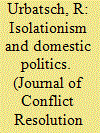

|
|
|
|
|
| Publication |
2010.
|
| Summary/Abstract |
Isolationism has long been seen as a reaction against domestic economic conditions or a threatening international environment, but domestic politics could equally spur such a reaction. Disagreement with current foreign policy or opposition to political parties directing foreign policy may provoke negative feelings on the general prospect of international engagement. Some of what appears to be isolationism, then, is not a universal rejection of international intervention but is instead contingent on partisan control of the executive. Data from the American National Election Studies confirms this: copartisans of the president are substantially less likely to agree with isolationist statements or simultaneously to support isolationism and specific interventionist policies. In addition to further illuminating the sources of public opinion about foreign policy, these findings suggest that some common measures of isolationism may not measure what they intend to measure.
|
|
|
|
|
|
|
|
|
|
|
|
|
|
|
|
| 7 |
ID:
061791
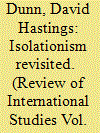

|
|
|
| 8 |
ID:
093252
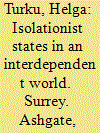

|
|
|
|
|
| Publication |
Surrey, Ashgate, 2009.
|
| Description |
vi, 182p.
|
| Standard Number |
9780754679325
|
|
|
|
|
|
|
|
|
|
|
|
Copies: C:1/I:0,R:0,Q:0
Circulation
| Accession# | Call# | Current Location | Status | Policy | Location |
| 054656 | 327.11/TUR 054656 | Main | On Shelf | General | |
|
|
|
|
| 9 |
ID:
099758


|
|
|
|
|
| Summary/Abstract |
International relations scholarship often describes America's foreign policy tradition as having isolationist tendencies or an isolationist dimension, a characterization derived most directly from American security policy in the 1920s and 1930s. This article offers a critique of this characterization. American diplomacy in the 1920s was subtle but ambitious and effective. American policy in the years leading up to the bombing of Pearl Harbor was in fact quite responsive to events on the European continent. In short, American isolationism is a myth.
|
|
|
|
|
|
|
|
|
|
|
|
|
|
|
|
| 10 |
ID:
172931
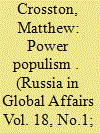

|
|
|
|
|
| Summary/Abstract |
In traditional understandings of classical populism, power is commonly
defined as being in need of devolving from the corridors of power and
out to a more grassroots foundation. At its core, populism was usually
seen as a belief in empowering regular people. ‘Regular people’ were
typically defined as being disconnected, if not outright disenfranchised,
from central power and outside the realm of the ‘elite.’ This paper
investigates the modern phenomenon in Russia and America that turns
these traditional concepts completely on their head. Rather than being
a movement engineered against elite political insiders, populism in
America and Russia currently seems to be occupied by the elites of
society. Ironically, these elites position themselves as the chosen
representatives of the disenfranchised. These strange bedfellows have
arguably produced a new form of ‘power populism’: instead of being
focused on removing power from the state, this populism is founded
more upon strengthening the global position of the state while tacitly
dismissing/attacking the perceived intellectual elite of each society.
|
|
|
|
|
|
|
|
|
|
|
|
|
|
|
|
| 11 |
ID:
154416
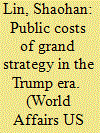

|
|
|
|
|
| Summary/Abstract |
American grand strategy is at a crossroads. The preferred trajectory of
president-elect Trump, hardball isolationism and nationalism, runs counter to
the American tradition of global leadership and liberal interventionism. Despite
Trump’s preference for a new grand strategy, it is far from preordained that he
will successfully resist Washington’s perennial pull of hegemony once sworn
into office. Therefore, it is imperative to examine the strategic preferences of
the American public, given that it has to bear the costs of this grand strategy.
So what can one expect when the public is disinterested in supporting such an
ambitious grand strategy?
|
|
|
|
|
|
|
|
|
|
|
|
|
|
|
|
| 12 |
ID:
160946
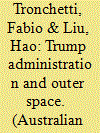

|
|
|
|
|
| Summary/Abstract |
In a relatively short period of time, the Trump administration has been fairly active in the field of space. The reconstitution of the National Space Council, under the direction of Vice President Pence, the President’s signing of Space Policy Directive 1, that calls for the return of humans to the Moon, and the announcement of a National Space Strategy that calls for an ‘America first’ approach in space, have been the highlights of this process. A key component of the administration’s approach has been the promotion of commercial (private) space activities through an effort of regulatory reform intended to facilitate free enterprise and individual initiative in space.
Overall, it is evident that the Trump administration views a consolidated US leadership in space as instrumental to ‘Make America Great Again’. However, due to the lack of cohesion in the management of the US space program, the controversial interpretation of international principles and the US-centred view of space endorsed by the administration, doubts remain as to whether the space policy of the Trump administration will foster US leadership in space or lead to its progressive isolation.
|
|
|
|
|
|
|
|
|
|
|
|
|
|
|
|
|
|
|
|
|